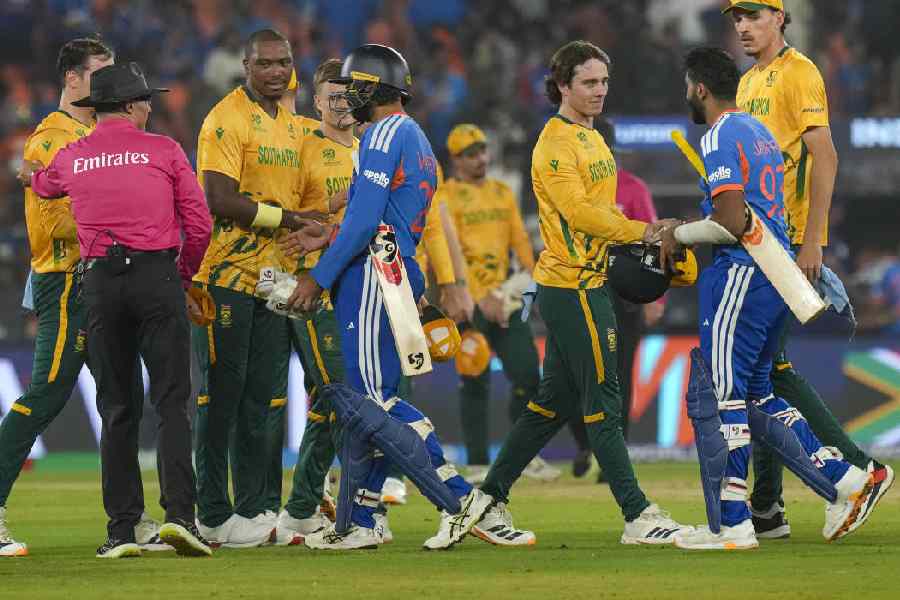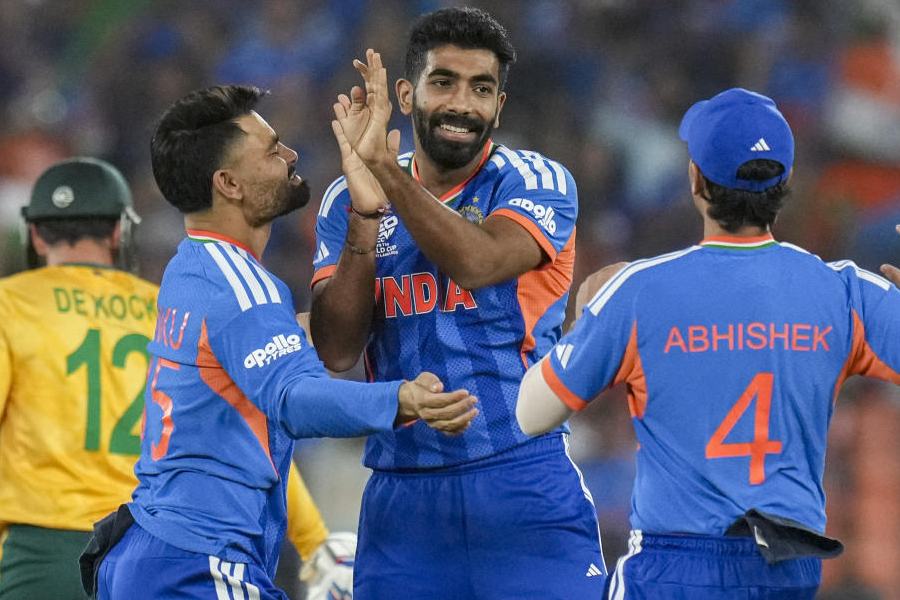|
|
| A moment of truth |
ramguha@vsnl.com
When Aparna Sen’s film Mr and Mrs Iyer came to Bangalore, my wife and I bought tickets for the first night. We hadn’t read the reviews, but had liked her 36 Chowringhee Lane. The title of this new film was intriguing. It suggested a sort of social comedy, perhaps a story of a Tamil couple marooned in Bengali-speaking Calcutta.
The morning of the day we were booked to see the film passed off well. We had two meetings, with a businessman and a property lawyer. In both cases our work was done with a superb mixture of efficiency and courtesy. The lawyer, especially, had great charm and a winning manner.
After the meetings had ended, and we drove home, it struck me that the men we had dealt with that morning had both been Muslim. This realization sparked a related thought: that while these men had done their jobs very well, they had done them with an air of relaxed assurance. This was because their religious faith and ours were both irrelevant to the transactions. But, I wondered, would Muslim businessmen or lawyers in Ahmedabad have been able to function so openly and so naturally with Hindu clients? Indeed, do Muslim entrepreneurs and professionals in that city have any Hindu clients any more? Have not those clients shunned them, or even, in some cases, exterminated them?
Bangalore and Karnataka have not been wholly free from communal riots. There have been Hindu-Muslim clashes in the city, as well as in the northern part of the state. But these have been sporadic rather than endemic, and relatively localized and of short duration: qualifying as communal “incidents” rather than as communal “riots”. In Bangalore, Muslims play a rather prominent part in economic and social life. The city’s most successful software entrepreneur, who is also its most generous philanthropist, is a Muslim. Bangalore’s most successful firm of builders is owned and run by a Muslim family. For years the most influential politician in the city, a long time (and still serving) member of parliament and senior Union minister, was a Muslim. In other trades too, Muslims are handsomely represented. From that community have come some of this state’s finest lawyers, teachers, scholars, writers, and cricketers.
Bangalore has a reputation for cosmopolitanism that is largely deserved. What I have said of Muslim participation in public life holds good for Christians too. Whatever your personal religious affiliation, this seems to scarcely matter when taking up a job or holding a profession. Whether lawyer or doctor, engineer or architect, a Muslim or Christian in Bangalore can go about his (or her) business with a reasonable degree of safety and security.
How long will this last? That question is prompted more generally by the recent happenings in the state of Gujarat, but also by the film that my wife and I saw at the end of a day spent in the hands of outstanding Muslim professionals. Mr and Mrs Iyer takes up different and (dare one say) larger themes than did 36 Chowringhee Lane, but the characterization is done with the same kind of subtlety and attention to detail. Speaking as a Tamil, I must say I was deeply impressed by the authenticity of Mrs Iyer’s accent, and the idiom in which she chose to express herself. Her real — as opposed to fictitious — husband, who has a cameo role towards the end of the film was also brilliantly portrayed. His look, his manner, his speech, his dress — all suggested a hardworking but socially bigoted Tamil Brahmin male. I have met dozens who looked and thought exactly like him.
Mr and Mrs Iyer succeeds as entertainment. However, it seems clear that, as with 36 Chowringhee Lane, Sen wished also to keep us thinking long after we had reached home. That earlier film had foregrounded the sometimes callous treatment of the elderly by the young. This one foregrounds the relations between Indians of different religious affiliations. How, it asks, how would we respond to a situation of great fear and insecurity, such as that created by an attack by fanatics on a mixed crowd in a bus? Would we give up some of our fellow passengers to a certain death, if we knew them to be of a different faith?
The answers that the film provides are not straightforward. One passenger reveals the identity of an old Muslim couple, but this is done to protect himself, for as a Jew, he too has been circumcized. Mrs Iyer saves a Muslim by passing him off as her husband; yet, through the long nights and days that they are together, her attitude towards him alternates between affection and distaste. Sometimes he is the man who gives her and her baby comfort and security; at other times he is the alien Muslim who might infect her with his touch and his water bottle.
The film’s message — such as it is — was presented in more straightforward form in a short clip we saw before it started. This came in the sequence of trailers and advertisements that preceded the main show. This particular “short” juxtaposed scenes of a man praying on a mat in a mosque, a choir singing in a church, a group of Sikhs eating langar in a gurudwara, and a procession outside a temple. No sooner did the church follow the mosque, than my wife and I simultaneously commented: “National Integration”. That, indeed, was what the advertisement intended to convey. However, what was notable about this didactic effort was that it was the handiwork of a private life insurance company. Once, we would have looked to the government of India to commission and promote films, whether short or long, on the theme of inter-communal harmony. Tragically, with the kinds of men who now rule India, this task has been left to creative artists and to broad-minded companies in the private sector.
In theory, commerce knows no religion. The successful promotion of capitalist enterprise requires it to disregard the caste or faith of those who produce as well as those who consume. Sales and profits absolutely require social peace and the rule of law. Riots are always bad for business. This message came out, very weakly, in an advertisement put out by the Ambanis after the Gujarat riots. It was articulated more strongly, and with conspicuous bravery, by one Gujarati industrialist, Deepak Parekh, in a newspaper interview that he gave shortly after the brutalities began.
On the other hand, capitalists always want to be seen on the right side of those in control of the state. Businessmen of all shades and — it must be said — all religions have shamefully sucked up to Bal Thackeray. Except for Deepak Parekh, no captain of industry spoke out directly against either the Godhra incident or the subsequent doings of Narendra Modi and company, and even Parekh was instructed to keep shut after his first interview. I myself believe that although sensitive film-makers and socially responsible industrialists can (and must) help, the maintenance of social harmony is ultimately the responsibility of the government of the day. Only it can effectively and reliably guarantee that citizens live, work and move about without fear of discrimination according to region or religion.
Aparna Sen’s film ends with a telling last line. In saying goodbye to her companion in torment, Mrs Meenakshi Iyer addresses him, actually a Muslim called Jehangir Chowdhury, by the name which he had assumed in his bus and train travels with her, “Mr Iyer”. This made me recall how, between 1988 and 1992, in the bloody days of the Ayodhya campaign, a friend of mine who is a distinguished historian of Uttar Pradesh had always to travel under an assumed Hindu name while going home or while doing fieldwork. That, verily, is the ultimate fear, that one has to change one’s name to protect one’s life in one’s own country. Thankfully, most Muslims in Bangalore or in Calcutta do not yet have to resort to this subterfuge. It is up to us to see that it stays that way.











